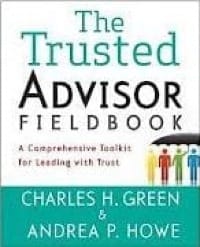New Book Review: "The Trusted Advisor Fieldbook"
New book review for The Trusted Advisor Fieldbook: A Comprehensive Toolkit for Leading with Trust, by Charles H. Green and Andrea P. Howe, 2011:


Almost exactly four years ago today, I wrote the following about the predecessor to this text: "Truly, the content that Maister, Green, and Galford provide in 'The Trusted Advisor' is absolutely brilliant. The only other consulting text that comes to mind which meets the quality of this work is 'The Secrets of Consulting', by Weinberg (see my review). And while 'Secrets' is an incredibly informative and entertaining masterpiece, the three authors who collaborated for this piece have provided a great service to anyone involved with advising other individuals, regardless of profession." What Green and Howe offer with this recent effort follows well in these earlier footsteps. In the words of the authors, this is "a more detailed how-to guide for people in any professional role", and I could not agree more. This book is not a replacement, but a compliment, providing a hands-on approach to developing and maintaining trust-based relationships that will certainly cause me to recommend it to colleagues.
The material that the authors present is broken down into five parts: Part 1 ("A Trust Primer"), Part 2 ("Developing Your Trust Skill Set"), Part 3 ("Developing Business with Trust"), Part 4 ("Managing Relationships with Trust"), and Part 5 ("Building and Running a Trustworthy Organization"). These parts are broken down into 31 chapters, each typically containing just a few pages, which greatly helped my digestion of the content as well as my focus on specific areas of trust. In addition, the conclusions of each of the chapters provide truly thought-provoking worksheets that challenged me during my reading and will continue to challenge me, as I expect to revisit these worksheets in the future as I grow as a professional. And one of the specific aspects about this book that I appreciated, as with "The Trusted Advisor", is all the lists throughout the book (164 in total, more than a 5-fold increase from the earlier effort!) that are also contained in a comprehensive appendix.
As a consultant, chapter personal favorites include Chapter 1 ("Fundamental Truths"), Chapter 3 ("The Dynamics of Influence"), Chapter 4 ("Three Trust Models"), Chapter 6 ("Listen"), Chapter 7 ("Partner"), Chapter 8 ("Improvise"), Chapter 9 ("Risk"), Chapter 15 ("Talking Price"), Chapter 21 ("Accelerating Trust"), Chapter 23 ("Shifting from Tactics to Strategy"), Chapter 24 ("My Client is a Jerk: Transforming Relationships Gone Bad"), and Chapter 25 ("Dealing with Untrustworthy People"). Based on my experience, all professionals will find valuable what the authors present within the chapters of Part 2. While many other texts address the fact that self-knowledge is essential, if any potential readers of this book do not have time to read everything that the authors have to share, the other chapters within this portion of the book (on listening, partnering, improvising, and risk-taking) should be considered required reading for everyone who works with clients to any degree.
The "Trust Equation", Trust = (Credibility + Reliability + Intimacy) / Self-Orientation, or T = (C + R + I) / S, is revisited and expanded upon by the authors alongside two other trust models in Chapter 4, resulting in one of the best discussions in the text. "Self-orientation, which we like to call your 'S', rears its ugly head most often when you feel some sort of fear: fear of looking bad, fear of rejection, fear of loss. All of these fears are perfectly normal. And they are what makes your S look big. What makes a difference is having the ego strength to see the fear, acknowledge it, 'get off your S', and move on. After all, obsessing about Big S mistakes is just more Big S." Following this discussion, "The Trust Creation Process", a five-step model (engage, listen, frame, envision, and commit) in which the authors stress order, is presented, followed by "The Trust Principles" that include a focus on the other, a collaborative approach, a medium-to-long-term perspective, and a habit of being transparent.
As the authors explain, "being or becoming trustworthy cannot be reduced to pure behaviors. Your actions are driven by your beliefs, and your beliefs are driven by your values or principles. Trustworthy behavior is far too complex to fake without beliefs and values behind it. If your values don't drive you to behave in a trustworthy manner all the time, you will be found out quickly. Hence, the trust equation and the way you use the trust creation process are really just outcomes of the principles you hold, the trust principles. The way to become trusted is to act consistently from those principles." And later, the authors introduce a refrain that is common throughout the rest of the text, especially echoing throughout part 3, which personally brought to mind the negative repurcussions an ABC (always be closing) mindset made famous by Alec Baldwin in Glengarry Glen Ross is likely to bring: "Focusing on relationships nurtures transactions, whereas focusing on transactions chokes off relationships."